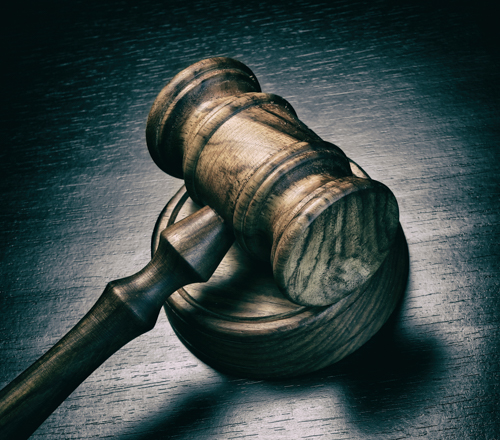- Future Students
- Current Students
- Faculty
- Staff
- Alumni
- Others
Putting the spotlight on wrongful convictions

Justice may be blind, but it isn’t perfect. In the Canadian legal system, it’s not asked that someone be found absolutely and undeniably guilty, only that their guilt is proven beyond a reasonable doubt. It’s a standard that allows for some uncertainty, and it means that sometimes innocent people are held responsible for crimes they didn’t commit. As the justice professionals of the future, the University of Guelph-Humber’s Alpha Phi Sigma chapter, the Justice Studies honour society, drew attention to this problem with Wrongful Conviction Day on October 3rd.
In UofGH's atrium, they presented the stories of famous miscarriages of justice like Steven Truscott and David Milgaard, and encouraged UofGH students to rethink the stigma that comes from being a suspect or arrested.
The day is Alpha Phi Sigma’s second annual Wrongful Conviction Day, which last year brought John Artis to campus, who was found guilty of murder alongside boxer Rubin “The Hurricane” Carter in the 1960s and later exonerated.
“We learn that our justice system is nearly perfect, but of course it has its flaws,” says Sandy Labib, President of Alpha Phi Sigma. “Somebody can be found guilty based on incorrect facts or bias, and we want to raise awareness about that.”
The most stunning recent example of this comes from Maria Shepherd, who was Wrongful Conviction Day’s keynote speaker this year at UofGH. For 25 years, Ms. Shepherd was considered guilty of manslaughter, but in a subsequent appeal, her name was cleared in just a few minutes. She spoke to the UofGH audience about how it happened.
In April of 1991, Ms. Shepherd’s three-year-old step-daughter began vomiting, gasping for air and fell into a coma. She was rushed to the hospital but nonetheless died two days later. A subsequent autopsy by pediatric pathologist Dr. Charles Smith claimed that she had died as a result of abuse, and so Ms. Shepherd was charged with manslaughter and held responsible for her step-daughter’s death.
Though she was innocent, Ms. Shepherd was up against the expert testimony of Dr. Smith, which was described as the “linchpin” of the crown’s case. She was worried about the threat of a long sentence and that the Children’s Aid Society would take away her three other children. These factors led her to plead guilty to the crime, and she was subsequently sentenced to two years in prison. For the 25 years since, she’s been considered guilty of killing her child.
It wasn’t until 2007 that Dr. Smith’s work was placed under scrutiny. His methods were reviewed by other professionals who concluded that Dr. Smith’s findings were wrong and that his opinions were “unreliable in the extreme” and “inappropriate and misleading”. He was stripped of his medical license, and the incident led to a reconsideration of the credibility of expert testimony.
When Ms. Shepherd had her appeal this February, with new evidence after the revelations about Dr. Smith, her conviction was overturned.
“We’re hoping that hearing Ms. Shepherd’s story gives everyone a different perspective on our legal system and its process,” says Miss Labib. “People need to understand these problems and how they can happen. Just because someone is labelled as a criminal doesn’t always mean it’s true.
Ms. Shepherd spoke along with her son, Jason, about the experience of her conviction and the fallout it had on her life, her family, and what’s changed since her appeal.
Learn more about Justice Studies at the University of Guelph-Humber.

